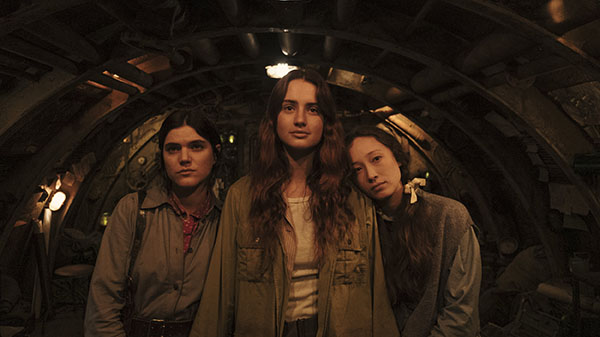Mayday is an enigmatic, but certainly unfavourable criticism of war, war movies, and the role of female characters among it all.
Before Mayday (2021) was released, I either read, heard, or dreamt that it was to be a war movie led by a group of female protagonists. Thus, I eagerly anticipated watching it. Then, the poster for Mayday was publicised – featuring Mia Goth in old-timey attire, carrying a bunch of guns, with planes flying overhead. Now, my eagerness turned more to excitement and my anticipation more to high expectation. This was due to a simple fact: a lady-led war movie is exactly the kind of movie I want to watch right now. I don’t want to see the next Ocean’s Eight (2018), or the next Ghostbusters (2016). I want to see an all-women remake of Full Metal Jacket (1987), or a male-less Expendables. I want the people funding those re-does, manipulating representation for profit, to really put their money on the table.
I want to see a movie adaptation of Battlefield V – where parachuting into a warzone, shooting big guns, and saving the world from devastation isn’t just a guy thing. I’m not going to watch the movie that puts Tom Cruise in another fighter jet but leaves Jennifer Connelly on the ground, nor watch the movie that reinforces Oppenheimer’s status in the public consciousness when Bochkareva remains, to many people, an obscurity. I wanted Mayday to cut the bullsh*t and pick up where 2020’s Shadow in the Cloud left off. But hey, we don’t always get what we want, and, in the case of Mayday, that’s perfectly alright. It’s perfectly alright because Mayday is all the more intriguing for not fulfilling any of the wants I’ve so far listed.
To me, Mayday seems to have come from the future. A future where the female-led Expendables has already been and gone. Mayday has seen the one-take military movie starring Saorsie Ronan as a battle-weary veteran, it’s seen the globe-trotting spy movie that sees Lashana Lynch jumping out of a plane and driving a tank, and it even caught that bonkers movie where Emma Thompson (playing a retired SAS soldier) despatches an army of thugs with her bare hands. Mayday has seen this fantastical movement of movies come to fruition, reach popularity, and fizzle out. Now, it comes into the past to ask, “just how desperate are you to see female-enacted war crimes on the big screen?” Fairly desperate, says I, despite what that may mean for my personality, and Mayday replies, “well, here you go dummy. You want to see women shoot guns and kill people? Here it is.”

This time traveller’s insight is well illustrated in a sequence particularly belittling of conflict, and the media that reproduces it for entertainment, in which Mayday makes a literal song and dance of war, with Ana (our main character, performed by Grace Van Patten) leading a band of soldiers around a clearing much like the Pied Piper might. But, I’m getting ahead of myself. I’ve not even told you what the movie’s all about yet! So, here’s the elevator pitch: Mayday is about a place like Neverland (you know, from Peter Pan), but this Neverland is a place for deceased women to have their revenge on the men that wronged them in life. Now, if you’ve seen the movie (then, firstly, why are you reading this? But also), it’s possible that you don’t agree with this overview.
If you don’t agree, I’d say that’s because there are many different ways of interpreting Mayday, and I’d say that that, in turn, is because thematically, there’s quite a lot of stuff going on. There’s an angle on feminine community – investigated through imagery of radio networks, sea life, and the map of stars above. There’s a subplot about our protagonists being sirens – luring soldiers to their deaths. There’s illusions to the importance of individuality – a single person being enough to change, or destroy, an entire world. There’s explorations of misogyny and misandry, heroic and psychopathic behaviour, trauma and memory, and likely more possible readings I either didn’t notice or have since forgotten. Despite all of this however, Mayday doesn’t feel fit to burst like it should. The movie is chock full of ideas and concepts and thoughts, but it’s not all developed into something concrete.
Fortunately for me, I like it when a movie feels a little wishy-washy, a little undecided, like it might pass through my fingers. The vagueness in Mayday creates this curious, inquisitive atmosphere. You might like that, you might hate it. I watched Mayday in June of last year hoping to write about it and here I still am – not totally sure what it’s all about. The thing I do know beyond a doubt though is that Mayday isn’t actually from the future (surprise!). And so, to me, it feels to be criticising a brand of movie that doesn’t exist yet. Yes, there are female-led action movies, crime movies. They’ve been around for ages. But right now, today, they’re no James Bond. They don’t open with a chase scene and then carry on looking slick and awesome for the next two hours. There’s always some awful justification, some misery or other.
Mayday itself falls at this hurdle, spending the first fifteen minutes ensuring that Ana lives in the poorest of circumstances. She’s homeless, is abused by her boss, and then takes her own life. I’d much prefer Mayday to have led by example – being an optimistic lookback on community and representation. Instead, it tries to balance its originality with its intention to criticise female-killer movies via imitation. Personally, I think Mayday missed a step. I want to see that imagined movement of movies first. Emma Thompson SAS soldier first. There’ll be plenty of time to criticise the ramifications of that representation once we’ve had it. Maybe one day I’ll see current movie trends the same way Mayday does, but right now I’m content to just keep playing Battlefield V.
Mayday is now available to watch on digital and on demand.

